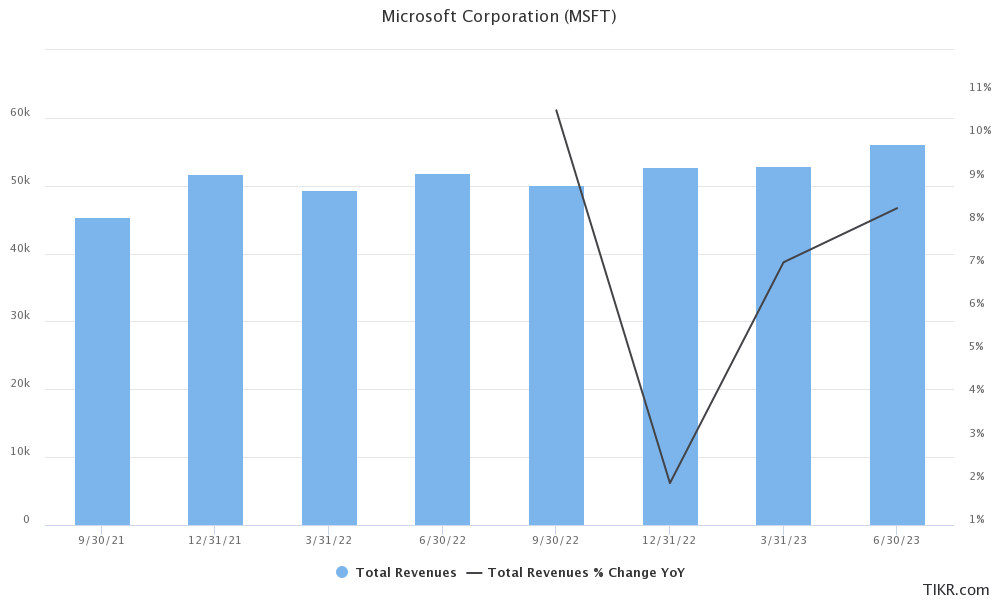Analysts Are Bullish on Microsoft despite Delayed AI Rollout
Please note that we are not authorised to provide any investment advice. The content on this page is for information purposes only.
Last week, tech giants including Microsoft (NYSE: MSFT), Alphabet (NYSE: GOOG), and Meta Platforms (NYSE: META) released their earnings. Microsoft stock fell after the earnings on weak guidance and the company’s comments on the rollout of AI.
Microsoft posted better-than-expected earnings though and its revenues rose 8% YoY to $56.19 billion which was ahead of the $55.47 billion that analysts expected. Nonetheless, it is the first time since 2017 that the company’s revenue growth was in single digits for three consecutive quarters.
Microsoft stock fell after reporting fiscal fourth-quarter 2023 earnings report
The company forecast revenues between $53.8 billion to $54.8 billion in the fiscal first quarter of 2024 which at the midpoint implies an 8% growth and trailed analysts’ estimate of $54.94 billion. While Microsoft’s adjusted EPS of $2.69 was ahead of the $2.55 that analysts expected, the stock fell after the earnings release.
Microsoft tempered AI expectations
During the earnings call, Microsoft CEO Amy Hood said, “Even with strong demand and a leadership position, growth from our AI services will be gradual as Azure AI scales and our Copilots reach general availability date.”
MSFT stock soared to a record high ahead of the earnings release when Microsoft said that it would charge $30 per month for the copilot AI subscription.
She added that the impact would be weighted towards the back half of the fiscal year. In its annual report, Microsoft also listed the availability of AI chips as a risk and admitted “Our datacenters depend on the availability of permitted and buildable land, predictable energy, networking supplies, and servers, including graphics processing units (‘GPUs’) and other components.”
Nvidia benefits from AI euphoria
Notably, the demand for AI chips has surged and Nvidia is among the biggest beneficiaries. The company smashed earnings estimates in its most recent quarter and its guidance was also way ahead of estimates – largely on account of strong demand for AI chips.
Meanwhile, after MSFT’s earnings release, UBS analysts led by Karl Keirstead said that “The messaging on Copilot was more about tempering rather than inflating expectations.” However, most Wall Street analysts remain bullish on MSFT stock despite the somewhat delayed AI rollout.
Analysts are bullish on Microsoft stock
Morgan Stanley analyst Keith Weiss said, “While investors may bristle over a lack of hand holding into FY24, we remain confident MSFT remains the long-term leader in AI.” Weiss added, “Holding a solid leadership position ahead of a large AI-driven tech cycle, Microsoft stands well positioned for durable double-digit EPS growth over multiple years.”
Notably, while some see the AI boom as a bubble, others see it as a long-term opportunity and predict that it would help spur GDP growth. Goldman Sachs for instance believes that AI would help increase productivity by 1.5% annually and help increase S&P 500 EPS by a minimum of 30% by 2030.
JPMorgan says MSFT’s premium valuation is justified
Microsoft shares trade at a significant premium to the S&P 500. JPMorgan analyst Mark Murphy meanwhile believes that the premium is justified and said, “While MSFT shares are valued at a premium on a P/E basis, we believe this premium is warranted based on faster recent organic revenue growth, robust FCF generation, a relatively stronger position within the enterprise, and our belief that Microsoft has pulled ahead of the pack with a state-of-the art cloud platform.”
Goldman Sachs analyst Kash Rangan also reiterated the buy rating and $400 target price on MSFT and said, “Microsoft is in the unique position to transform the way software augments human productivity as it showcases the value it can drive in synthesizing, creating, and sharing information across a variety of different use cases.”
Edge continues to increase its market share
During the earnings call, Microsoft said that Edge gained market share in the quarter making it the ninth consecutive quarter of market share gains. It further added that Azure also continues to gain market share. Unlike fellow tech giants, Microsoft does not provide a quarterly revenue breakdown for Azure but said that in the fiscal year 2023, its cloud revenues rose 27% in constant currency and reached $110 billion with Azure accounting for over half of that.
It was also bullish on LinkedIn and said that the membership growth has accelerated for eight quarters and the revenues surpassed $15 billion for the first time ever.






